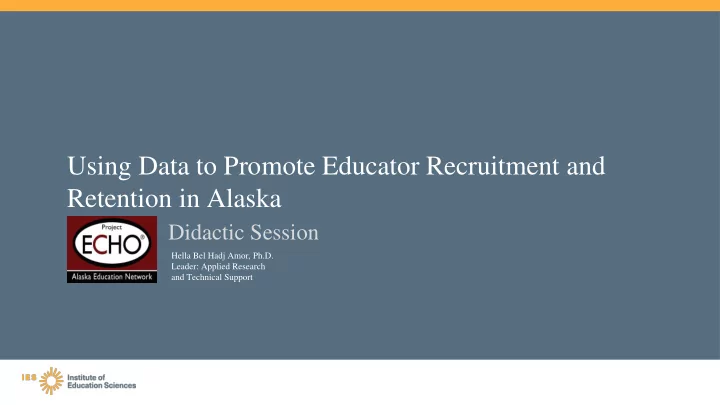

Using Data to Promote Educator Recruitment and Retention in Alaska Didactic Session Hella Bel Hadj Amor, Ph.D. Leader: Applied Research and Technical Support
Regional Educational Laboratory (REL) Northwest
About REL Northwest Regional Educational Laboratories (RELs) partner with practitioners and policymakers to use data and evidence to help solve educational problems that impede student success. We do this by: • Conducting rigorous research and data analysis • Delivering customized training, coaching, and technical support • Providing engaging learning opportunities 3
Alaska State Policy Research Alliance (ASPRA) Goal: Produce and share evidence on Alaska education issues that matter most 4
Agenda Introduction Research context Process Practice Closing 5
Goal and Objectives • Goal: To be able to identify and use data relevant to teacher recruitment and retention to better understand and address those issues in local contexts • Objectives – Become familiar with the problem of practice technique – Practice engaging in a problem of practice to begin to address a relevant challenge in collaboration with peers 6
Research Context Educator Retention and Turnover Under the Midnight Sun: Examining Trends and Relationships in Teacher, Principal, and Superintendent Movement in Alaska: • Study: https://files.eric.ed.gov/fulltext/ED598351.pdf • Infographic: https://ies.ed.gov/ncee/edlabs/regions/northwest/pdf/ak-educator-retention- infographic.pdf Source: Vazquez Cano, Bel Hadj Amor, & Pierson, 2019 7
The percentage of teachers who did not return to their school or role has been steady over time Source: Vazquez Cano et al., 2019 8
The percentage of principals who did not return to their school or role varied over time Source: Vazquez Cano et al., 2019 9
The percentage of superintendents who did not return to their district or role varied over time Note that we did not have data for superintendents in 2012/13 Source: Vazquez Cano et al., 2019 10
Higher percentages of rural teachers (and principals) did not return to their school or role Source: Vazquez Cano et al., 2019 11
Teachers prepared outside Alaska had higher turnover rates Source: Vazquez Cano et al., 2019 12
Schools with higher percentages of students eligible for free or reduced-price lunch had higher turnover rates Source: Vazquez Cano et al., 2019 13
Process 14
Process Description • A problem of practice protocol is an opportunity for a participant to present a challenge they are addressing and receive constructive feedback from other participants • Usual key steps: – Review of process and roles – Presentation of the problem of practice – Group clarification questions – Group collaborative inquiry – Group resulting ideas – Presenter response – Group debrief 15
Practice 16
Review of Process and Roles for Today • Simplified roles for today • Pre-selected problem of practice 17
Clarification Questions • Why is this a problem? • Does your school face this problem? How do you know? • If you have faced this problem, what have you done? What have you not done? • Who are the right people in your school or district to act on this problem? Source: West Wind Education Policy, 2016 18
Group Collaborative Inquiry • What is really happening? What are different ways to interpret what is happening? • What hypotheses are we making when we say why this is a problem? What values do we hold, and how might they affect the way we are looking at this problem? • How could we test our hypotheses? • What are different ways to think about the nature of the problem? How might the problem be redefined? Source: West Wind Education Policy, 2016 19
Group Resulting Ideas • What ideas do you have for next steps? • Are there hypotheses we have not considered, and how would this change our answers? • How might you build on work already underway to solve this problem? • What are some smart risks or small experiments you might take in the next 30 to 90 days? • How might you know if the solutions are working? Source: West Wind Education Policy, 2016 20
“Presenter” Response 21
Closing Baasee ’ Thank you Quyana 22
Contact Us Hella Bel Hadj Amor, Ph.D. hella.belhadjamor@educationnorthwest.org 503.275.9587 REL Northwest at Education Northwest ies.ed.gov/ncee/edlabs/regions/northwest 101 SW Main Street Suite 500 @ relnw Portland, OR 97204-3213 relnw @ educationnorthwest.org 800.547.6339
References • Vazquez Cano, M., Bel Hadj Amor, H., & Pierson, A. (2019). Educator retention and turnover under the midnight sun: Examining trends and relationships in teacher, principal, and superintendent movement in Alaska. Portland, OR: Education Northwest, Regional Educational Laboratory Northwest. https://eric.ed.gov/?q=ED598351&id=ED598351 • West Wind Education Policy (2016). Leadership and educator effectiveness, a collaborative inquiry protocol. Iowa City, IA: Author. 24
Recommend
More recommend